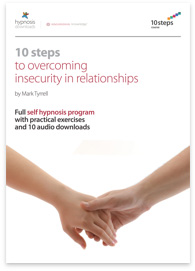How to Handle the Pain of Unrequited Love
7 tips for the lovelorn romantic engaged in a one-sided love affair
 "Unrequited love" courtesy of brandoncwarren
"Unrequited love" courtesy of brandoncwarrenUnrequited love's a bore, yeah
And I've got it pretty bad
But for someone you adore, yeah
It's a pleasure to be sad...
("Glad to Be Unhappy", The Mamas and the Papas)
'Unrequited love' - sounds kind of old-fashioned, doesn't it? It conjures up scenes of 18th-century folk wandering around misty moors, composing poetry, passionately yearning for the merest glimpse of their beloved. Infatuation, longing, and love can be agonizing when they remain unreciprocated; when the focus of your love sees you as 'just a friend' (or not even that). Unrequited love can hurt like @#!*% .
Prefer to watch instead?
Unrequited love's pedigree
The concept of unrequited love may sound out of date. But, as evidenced by the huge number of people searching the term online, human concerns haven't really changed all that much since good old Will Shakespeare purportedly wrote: "Love is the most beautiful of dreams and the worst of nightmares."
Most of us experience the pangs of unreturned affection at some point in our lives. But for some folk, unrequited love becomes obsessive; they come to feel that they can become complete and fulfilled only through union with the object of their longings. The danger is that they come to feel that without that union, their life loses all meaning. And when meaning drains from life, we become depressed. So what are some of the common symptoms?
Unrequited love is seriously distracting!
"My thoughts continually turn to him; every song reminds me of his face. I fantasize about us being together. Sometimes I awaken and know I've been dreaming about him. It's an ache that literally hurts my chest. In the hours and days after seeing him, I can't eat, sleep, or concentrate on work! It's not just infatuation; it's real love!" These are the words of a woman in love with a married work colleague.
Unrequited love can lead to listlessness, anxiety, disturbed sleep, and depression. The great philosopher Charlie Brown put it so well: "Nothing takes the taste out of peanut butter quite like unrequited love." And that's very germane. Unrequited love can feel overwhelming and spoil many of life's enjoyments - making all contact, other than with the beloved, seem pointless.
So what can you do about it?
As with all emotional distress, there are things you can do to lessen and even stop the pain. Try these and who knows; you might be moving on quicker than you'd thought possible.
1) Can you accept that they're just not that into you?
There's a massive amount to be said for resilience and determination, but as with anything, context is vital. There is also much to commend flexibility and the capacity to exercise the knowledge of when to 'cut your losses'.
Love is romantic; those moments of utter connection and transcendental sympathy with another person, almost as if nature wants us to experience a merging of two into one as a kind of universal blueprint and preparation for a more spiritual fulfilment. Now I'm getting carried away. But everything has to have practical basis.
We are brainwashed by romantic fiction to believe that enough determination will awaken within others what they don't know themselves. And if we only try hard enough, we'll get our guy or girl - it works in romantic fiction, right?
Don't fall for this. How much time (including fantasy time) have you spent on this person?
"If only I could make them see... Just a little longer, if we could just speak together..."
Enough already. It may sound harsh, but sometimes knowing when to give up is the first step to real success.
2) Know (really know) who you are in love with
Ever heard of jailhouse love? Don't get me wrong; the unattainable may have its attractions (not having to confront reality is one of them). However, that 'unattainable' may be doing life for mass murder.
Maybe you've hardly ever met that unattainable in the flesh, but it suits you to believe that he (usually he) is really just 'misunderstood'; that beneath that cold-hearted, psychopathic, mass-murdering exterior, he's really a loving and lovable guy just in need of some unconditional love.
A woman who falls for a man in jail is a stark illustration of what we can all do to a lesser extent. She has fallen for a man she's met in her mind who is, perhaps, barely approximated by the man in jail. She may even marry that 'man in her mind' even as the fleshy incarnation of her own inner phantasm rots in prison.
We all do this to some extent - not fall in love with serial killers, but create an image in our mind of whom we fall for as distinct from the real person. That's fine in some ways, but not if the fantasy and the person are in reality very different.
Are you in love with a fantasy - a concoction? Do you love this other person or your own creative projection? Many people who fall in love deeply quickly feel as if they 'know' the person for whom they've fallen. If the person they've fallen for is mainly a concoction of their own imagination, then it's not surprising they feel an instant connection.
When unrequited love feels overwhelming, dwell on this idea: that you may not love the real them at all because you don't know them.
3) Keep your wider life going, and growing
The thoughts stemming from the feelings of unrequited love are all or nothing: "Without this person, my life is meaningless! ... Unless I have them, I don't want anyone!" Putting all of one's eggs in one basket is always a dangerous strategy. "If I could only have this person, then all my problems would disappear!"
When we're in love, we just want to be in love. The chores, mundanities, and obligations of life become unwanted distractions clawing for our attention, which we'd rather reserve for the love of our life. This becomes dangerous if we begin to actually neglect other friendships and human contact (because they are not the person).
Unrequited love hits harder if we stop meeting our basic emotional needs for companionship, creativity, and emotional intimacy (which can be got from good friends). Get outside, exercise, go and see non-romantic movies, call up old friends you haven't seen in a while. Keep doing all the stuff you'd normally do, even if you don't feel like it, as these activities will buffer your peace of mind and help you move beyond your forlorn focus.
Ah, this brings us onto...
4) Glimpse the future in all its possible forms
Once a king who felt victim to the ebbs and flows of his mind gathered his wisest advisors and set them a task: "Produce for me an artefact that whenever I am low will make me feel better and whenever I am too high and mighty will steady my state and bring me balance." The advisors duly reported back to him a few days later and the wisest presented the king with a golden ring. The king put the ring on and noticed that when he looked carefully, he could see the inscribed legend, "This too will pass". In future, whenever the king felt overwhelmed by anything at all, he would read these words and reflect on them.
When I was three, I was 'in love' with a red toy bus; seriously, it was perhaps the main focus of my life and I would insist on taking it everywhere - that bus and I were meant to be together...always. That's how it felt at the time, anyway. The point? It feels like it's always going to feel this way; but it won't always feel this way. There have been literally decades in which I hadn't thought about that toy bus. Back then, if I'd verbalized it, I would have scorned the idea that one day I'd 'move on' from my early bus love. And, dare I say, it can be the same for people we've loved.
Get into the habit of self-hypnotically projecting your mind into the future - to a time when you can look back to the present and wonder what all the fuss was about. This is a great way to actually start to naturally feel better - above and beyond all the 'good sensible advice'.
5) Get out of the pit
When we're in love, even if it's with our own imaginative version of a person, it's easy to wallow in romantic fiction, 'Rom-Coms', poems about undying love, mid-distance dreamy staring in the checkout queue, Cameron Diaz and Colin Firth. But overdoing this can cause you further problems. If you're really suffering because of your unrequited passions, then this is akin to rubbing salt into a lacerated leg wound repeatedly. It's gonna hurt.
At the risk of presenting myself as completely insane, I once asked a client who had been obsessing about a woman he worked with and was finding night times impossible to deal with to "research the top twenty service stations catering for UK motorways north of London as rated by customers". I asked him to compile me a report on it. Romantic or what!
My rapport with this man was such that I convinced him to do it - and because he was a perfectionist, once he'd agreed, he couldn't not do it. The next day, he came in and told me that after this onerous but logical task, he'd slept soundly, hadn't much thought about this woman, and felt like he turned a corner. I'm not suggesting you do this task, but I am illustrating a point.
Do things that engage your logical, planning, strategic brain. When people are depressed, they have less activity in the prefrontal lobes of the left side of their brain (1), so purposefully doing logical activities (which can be way more interesting than that guy's task) can help stabilize mood and help you feel much more detached and objective about stuff that was bothering you. You need perspective to deal with unrequited love.
6) Watch out - it doesn't mean there's anything wrong with you
When you love someone who doesn't seem to care for you (or at least not as much), it can be easy to agonize over why they don't like/love you the way you do them. The fact is, you may be the best looking, wittiest, brightest, most fun person in the world, and they still may not like you the way you like them. Trying to get something from someone who doesn't have it to give is a little like King Cnut commanding the waves to stop their tidal flow to shore. If they don't love you, it's not because you've done anything wrong. Some people aren't very good at loving.
7) Find someone who can give you what you need
Loving whilst being loved in return - that great emotional symmetry - is what really fulfils. Some people get into the destructive pattern of only really falling for people who are 'unavailable' in some way, perhaps because they are with someone else or emotionally unable to commit to a relationship.
Unconsciously making unavailability a prerequisite for falling in love is like insisting on going swimming only in dry deserts - it's never going to really work. If you have been doing this (or you suspect you have), at least become conscious of it and reflect that it's a self-defeating strategy.
Focus on finding someone who likes you for who you are. And don't confuse the intensity of agony with the intensity of real love. You'll know once you have found the real thing, because it will flow in both directions.
Just think for a moment how wonderful it's going to feel when you no longer have to obsess about that person. How you'll be able to choose whether to think about them or not. And when you do, you are able to feel calm and detached, putting it down to part of life's rich tapestry of experience.
Real love should make you happy and contented, not miserable and anxious. Unrequited love can never be anything but painful. For harmony in a relationship, the force of attraction needs to be balanced. Just imagine how good it's going to be when you find someone who knows how to love you as you love them.
10 Steps to Overcome Insecurity in Relationships course
Despite how much you love your partner, are you worried you're driving them away?...
References
- Decreased prefrontal cortex activity at rest, especially on the left side, is consistent with (brain imaging) findings in depression. The severity of depression is often related to the degree of frontal hypometabolism. Several studies have indicated that the hypometabolism normalizes after treatment if the patient's mood improved. When depressed patients perform a concentration task, the left prefrontal cortex often activates to normal levels with the effect of improving their mood. Dwelling on problems has the effect of lowering left brain prefrontal activation and lowering mood. S. Lui, L. M. Parkes, X. Huang, K. Zou, R. C. K. Chan, H. Yang, L. Zou, D. Li, H. Tang, T. Zhang, et al. "Depressive Disorders: Focally Altered Cerebral Perfusion Measured with Arterial Spin-labeling MR Imaging". Radiology. May 1, 2009; 251(2): 476-484.







